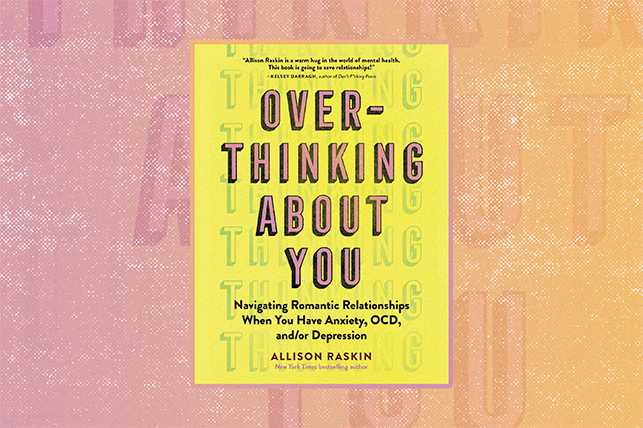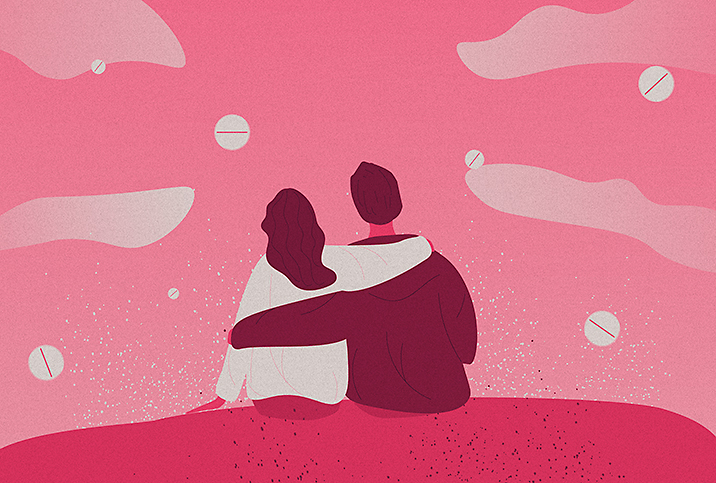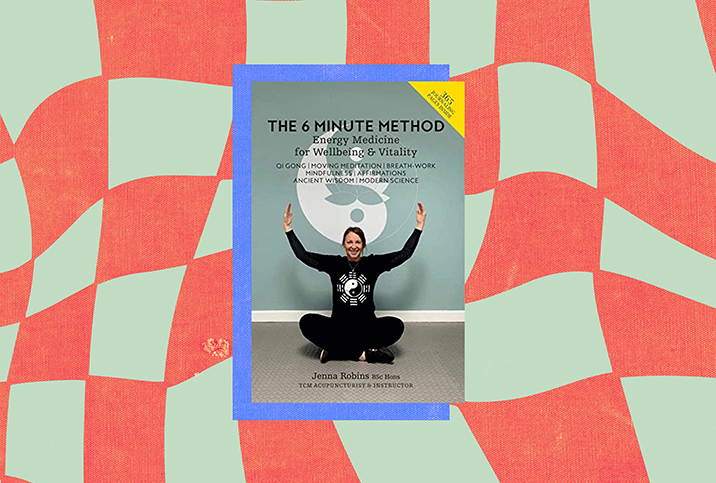Between the Pages: 'Overthinking' Looks at Romance Through an OCD Lens

"I have been guilty of every 'crazy girl' stereotype out there," writes Allison Raskin in the opening chapter of her deeply personal memoir and self-help guide, "Overthinking About You: Navigating Romantic Relationships When You Have Anxiety, OCD and/or Depression."
Raskin co-hosts the long-running podcast "Just Between Us," runs the popular Emotional Support Lady Instagram account and is currently getting a graduate degree in psychology from Pepperdine University.
She wants you to know you're not alone as you navigate romantic relationships and mental illness. In addition to sharing her personal journey of dating while living with obsessive-compulsive disorder (OCD), the pages of "Overthinking About You" contain valuable insight from clinical psychologists, a psychiatrist, a sexologist, relationship experts and real-life couples.
In this exclusive interview with Giddy, Raskin discussed relationship obsessive-compulsive disorder (ROCD), why a brand-new relationship shouldn't feel difficult, when to have "the talk" about your mental health with a new partner, and a healthy approach to sexual issues.
Editor's note: This interview has been edited for length and clarity.
You discuss having an 'adult perspective on how healthy relationships work.' What does that look like?
Raskin: I think we are taught to believe by the media that "true love" means that when you meet the "right" person, they instantly understand all your wants and needs and you are attracted to them 24/7. In reality, we have to learn how to be in partnership with each other. Your partner doesn't know how to be the best partner for you unless you tell them.
I also think an adult perspective allows us to not feel pressured to always feel passionate or even attracted to our partner. Relationships ebb and flow, and you aren't going to feel the same day to day or even moment to moment. That's OK so long as there remains a willingness to work on things and the presence of mutual respect.
What is ROCD and how does it differ from general OCD?
There really is no such thing as general OCD. OCD manifests differently in everyone, but there are some common subsets, such as harm OCD, contamination OCD and relationship OCD.
ROCD can be partner-focused or relationship-centered. In partner-focused ROCD, people tend to obsess over their partner's potential "failings." Are they smart enough? Are they good-looking enough? In relationship-centered ROCD, it is more an obsession with your own feelings about the relationship and if it is the "right" one for you or if you are in "real" love. Both types are mentally exhausting and can majorly interfere with your relationship.
You talk about how a new relationship shouldn't require a lot of heavy lifting; it shouldn't feel hard. Can you expand on that? Why is that old adage 'Relationships are hard work' perhaps misguided?
I definitely think long-term relationships take a lot of hard work. To me, the difference lies in how long you have been together. If you're starting out a new relationship and it feels like trying to push a boulder uphill, that is maybe a signal you aren't super well-matched.
Sometimes we meet people during difficult times in our lives, which can make growing a connection harder. But I'm more talking about if you remove all the external stuff and the connection between the two people is taking a lot of work or there is a lot of fighting from the onset. Enough hard stuff will come later. You don't need to be fighting nonstop with someone you've only known for three months.
When starting a new relationship, when and how should you talk to your partner about your mental health?
Unfortunately, there is no one-size-fits-all [answer]. But I do think there are helpful guidelines. You don't really need to discuss this type of thing until you're talking about more serious stuff in general.
So if all of your dates have been pretty surface-level so far, you don't need to sit them down and lay out your mental health history. But once you're both starting to open up and share more parts of yourself, it's a good time to begin to share.
Make sure you are sharing from a place of wanting them to know this information because you are genuinely trying to get to know each other and not sharing compulsively. Sharing compulsively looks like, let me just word-vomit everything out all at once so they can take me or reject me.
You want to feel in control of the information, both in what you share and the way you share. Be mindful of your environment and the energy you're exuding. Also, be mindful of how this person is receiving your information. Are they respectful and curious? Or are they sending signals that maybe this isn't someone who deserves your disclosure and vulnerability?
In your chapter on sex, you write, 'Your partner should never view your sexual issues as something that can be "fixed" or "solved."' Why is it harmful for a partner to do that?
If your partner is trying to "fix" you, there is an inherent implication you are broken or faulty in some way. There can also be a sense that if you don't get "fixed" soon, they will leave. Neither of those things creates a safe space in the bedroom or in the relationship, and could very well lead to more sexual issues.
A lot of people struggle in the bedroom for a variety of reasons. If you struggle, you want to find a partner who is understanding and accommodating. Otherwise, it's easy to fall into a shame spiral or beat yourself up. All those negative thoughts and fears will just further get in the way of your sexual connection. The goal is to find someone who can help support you if you are looking to work on things but not pressure you to get "better" for them.
What do you hope people with anxiety, depression or OCD will take away from reading your book?
So many things. But I think the most important takeaway is that even if it is harder for us to have romantic relationships, we are still allowed to want them and are absolutely able to have them. We don't have to give up or think this is an area of our lives that we can't get better at. It's possible through some self-work to show up in a different way than we have before, and I find that really exciting.


















